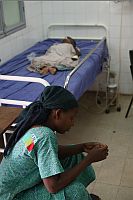 Last year in Mali, my colleague Julie Buss-Younkin met Tiemany Diarra, a mother who lost her only two daughters, Clarice and Kalifa, to pneumococcal pneumonia in adjacent hospital beds twelve months apart. My colleagues and I were struck by the fact that in one year, this mother lost both of her daughters from lack of access to a vaccine that is routinely available to our children here in the United States.
Last year in Mali, my colleague Julie Buss-Younkin met Tiemany Diarra, a mother who lost her only two daughters, Clarice and Kalifa, to pneumococcal pneumonia in adjacent hospital beds twelve months apart. My colleagues and I were struck by the fact that in one year, this mother lost both of her daughters from lack of access to a vaccine that is routinely available to our children here in the United States.
Inequitable access to life-saving vaccines brings unnecessary ill health, suffering, and costs to children and families across the world every year. This lack of access is predictable and avoidable.
In an effort to accelerate and expand vaccine access throughout the developing world, today the Johns Hopkins Bloomberg School of Public Health is launching its new International Vaccine Access Center (IVAC). The goal of IVAC is simple: To help develop and ensure the implementation of policies that make vaccines accessible to everyone that needs them.
A unique feature of IVAC is its policy-driven focus on vaccine access. Two questions I often get are: why are urgent efforts needed to ensure global vaccine access and why is a focus on policy development and implementation a key to success?
Vaccine access is what is achieved when countries have access to the right vaccines for their populations, and when the populations of those countries, however resource-poor, can access them through robust systems for safe, effective vaccine delivery. We have learned over the years that it can take as long – or longer – to roll out a life-saving vaccine to the world’s neediest children as it did to discover and manufacture the vaccine in the first place – making a focus on vaccine expansion an urgent priority.
For example, only two developing countries in Africa currently have access to pneumococcal vaccines, despite the fact that 98% of pneumococcal deaths occur in the developing world and pneumococcal vaccines have been available since 2000. On top of that, nearly one-quarter of children are still not consistently reached by systems that deliver the vaccines. Simply put, ensuring that all children of the world have access to life-saving vaccines represents the goal that should be behind nearly all of our collective efforts in vaccine development and introduction.
And why is a policy development and implementation focus key to success? A policy focus emphasizes processes that facilitate access because it requires the use of evidence, the engagement of policymakers, and the communication of the reasons for the policy to everyone else involved. Parents, donor governments, and vaccine providers often fail to accept or support vaccines when they are unclear why the vaccine is being recommended or why they should pay for it. The result is a missed opportunity to improve health. At the end of a transparent, evidence-driven policy process the rationale for vaccinating (or not) the population is clear to all these parties and thus helps to maximize the likelihood of implementation.
The broad diversity of skills and unique approach at IVAC make it qualified to tackle these problems. By blending physicians, vaccine researchers, economists, policy analysts and communications specialists into a single, focused team, and by drawing on the best practices of both private and public sectors, IVAC aims to tackle challenging issues with innovative solutions that might be absent in a narrower approach.
The Johns Hopkins-based IVAC team includes experts with a track record of success in accelerating access to pneumonia vaccines through its PneumoADIP and HibInitiative projects. Working with colleagues at the GAVI Alliance, the World Health Organization, UNICEF, the World Bank, and in civil society, this team has helped shape vaccine recommendations and financing policies, like the Advance Market Commitment, that have increased access to Hib and pneumococcal vaccines for millions of children in developing countries. Together accelerated access to these vaccines can prevent more than 700,000 child deaths each year.
By building coalitions like World Pneumonia Day and working with partners like PACE, a project of the Sabin Vaccine Institute, the IVAC team has developed a global network of colleagues who share their commitment to vaccine access. With the launch of IVAC, these coalitions can now be mobilized to address other vaccine-preventable diseases like diarrhea, meningitis, influenza, and cervical cancer.
A colleague of mine likes to say, “The road to inaction is paved with research reports”. When evidence drives policy it improves the likely acceptance of the policy by everyone involved, but we need to be realistic. We have learned that it is not enough to generate the evidence, we also need to make sure that evidence reaches the people who need it: policymakers. That’s why IVAC will combine our research with evidence-driven communications. At IVAC, we’ll work on policies, we’ll generate new information and get it into the hands of decision-makers, and we’ll do our work rigorously and precisely. But we’ll also remember that at the end of the day this is about children like Clarice and Kalifa, and parents like Tiemany Diarra, not statistics.
To learn more about IVAC or to support its work with a donation, visit www.jhsph.edu/ivac or email ivac@jhsph.edu. Your comments on this blog are also welcome. There would be no better way to kick off IVAC than to have a great vaccine access dialogue on Huffington Post! Or if you are on Twitter, pass the blog along with a tweet.